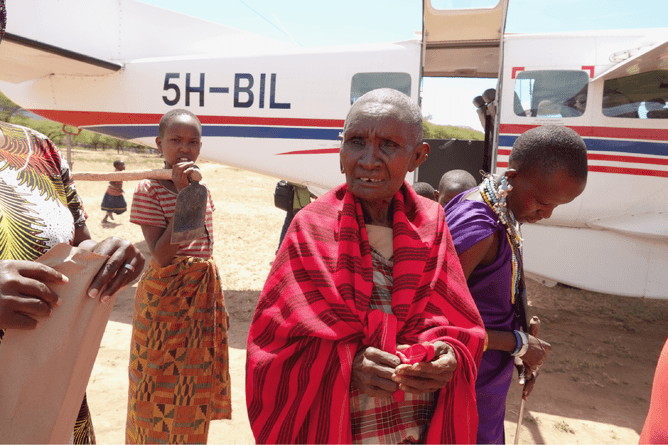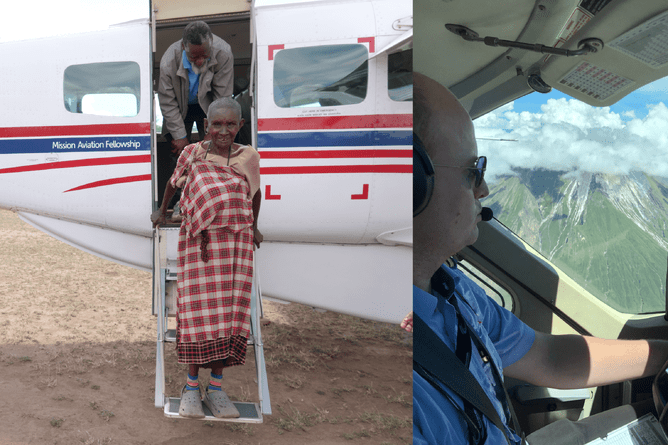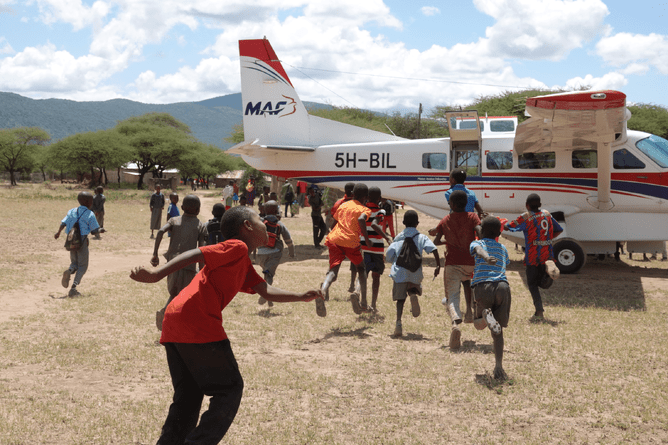MAF flew 70-year-old Ngoita from Arusha to Malambo after cataract surgery in Arusha, which restored her sight.
Ngoita, affectionately called Koko, which means ‘grandmother’ in Kimaasai, began her journey earlier this year during a mobile medical clinic run by Help for the Maasai, a partner organisation supporting vulnerable people in remote Maasai communities.
Cataracts in both of Ngoita’s eyes were discovered, severely limiting her ability to function independently. She was brought to a clinic in Malambo for initial care, and arrangements were made for her to travel to Arusha for surgery. Ngoita first connected with Help for the Maasai in 2018 when she sought treatment for a leg wound. Since then, the organisation has provided medical care, food, and welfare support.
When her cataracts worsened, they facilitated her travel to Arusha. After surgery on the first eye was completed, she regained some vision. The second eye was repaired during her most recent visit, just before MAF flew her back to Malambo. The flight, lasting 35 minutes, spared her a long, difficult journey that could have taken at least 8 hours.
Pilot Peter Griffin was moved by her story. Peter noted that Ngoita was older than most passengers he had flown, especially considering that many do not reach such ages due to hardships, health issues, or lack of access to care. He described her as having a peaceful demeanour.
“She radiated a sort of joy that is rare. She was very excited to fly on the plane, and didn’t seem nervous. She had an interesting sense of peace and calmness. She was mostly just very happy to return home to Malambo,” said Peter.
“I have no fear, I just enjoyed the aeroplane,” Ngoita said. “And my eyes are much better now after the operation. I’m thankful.
Ngoita’s situation was difficult. Blind in both eyes, widowed, and without a stable home, she moved from household to household, depending on others for food and shelter. She had no income and relied on community support.
Her story involves significant loss. She gave birth to seven children, but five died. The remaining two are married daughters living with their husbands.
In Maasai tradition, family lineage is carried on by sons, and once married, daughters typically become part of their husband’s family, leaving elderly women unsupported.
By flying her quickly and comfortably, MAF helped preserve her strength and joy.
“If she had travelled by bus, she would have arrived very tired, but thanks to MAF, she arrived still strong and happy,” a social worker from Help said.
Buses from Arusha don’t reach Malambo—they stop at Sale, where travellers are typically picked up by a boda boda (motorcycle taxi) for an hour-long ride on dusty, rough roads. Arriving in Malambo this way often means being exhausted and dirty. Upon landing in Malambo with MAF, Ngoita was visibly pleased. She could see children playing, distant mountains, and her surroundings clearly. She walked without assistance and full of new energy. "I can see, don't hold my hand!
“I can’t believe I can see everything,” Ngoita said. “Everything is very clear now.”
STORY & PHOTOS / ANNET NABBANJA


